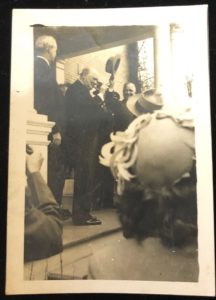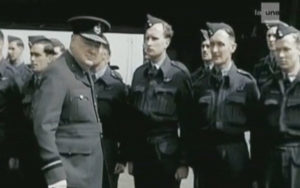
Bulletin #172 — Sep 2022
Winston on the Fringe

Edinburgh, Scotland
September 4, 2022
Churchill Looms Large at 2022 Edinburgh Festival
By ALASTAIR STEWART
Edinburgh’s annual International Festival and Festival Fringe together make the single most extraordinary celebration of arts and culture on the planet and an unrivalled explosion of creative fusion. No topic is off bounds, and a recurring theme is Winston Churchill and the Second World War. I was fortunate to see an array of shows this year. Churchill’s recurring presence at the Festival should remind everyone of the importance of the theatre in shaping modern understanding and sparking interest in history.
The Scottish capital has only half a million residents, and it is hard to convey how literally every nook and cranny, bar and restaurant, is turned into a Festival venue. It is open access, and artists and performers take to hundreds of stages throughout the city to present shows for every taste. This August, there were more than 50,000 performances across the town in less than a month. I am going to tell you about six.

2025 International Churchill Conference
Winston and David is a highlight of this year’s Festival. The fifty-minute show holds the distinction of being written by Robert Lloyd George, a great-grandson of the titular David (David Lloyd George). Perhaps rarer still among Edinburgh Fringe shows is that large parts of the show use “unseen family documents.”
Winston and David met in 1901, the day of Churchill’s maiden speech in the House of Commons, and remained fast friends until Lloyd George died in 1945. This three-person stage performance is a fascinating insight into how Lloyd George’s family understands one of Britain’s great political relationships and their ancestor’s life.
It also gives sense to a general misbelief that Churchill’s early political life was, as Robert Rhodes James called it, a “A Study In Failure, 1900–1939.” The question tacked onto the end of that summation is rarely asked: just who was Churchill’s mentor?
Skilfully directed by Nick Hennegan, the audience finds themselves in the offices, homes, and even the golf course of two very different politicians. There is genuine “bromance” and allegiance across party and class lines. As the decades go on, so do the score of each man’s successes and failures. An uncomfortable reflection emerges of how they found themselves leading a country in two separate global wars.
D.L.G. might never have entirely left the public psyche, but his role to a young Winston, eleven years his junior, is exciting. The narrative is from the perspective of Frances Stevenson (played brilliantly by Alexandra Donnachie), David’s secretary, mistress and later wife in 1943. Known as Pussy, the audience is exposed to a narrator who has been largely forgotten in history—and her story is shocking.
There are extraordinary question marks over the paternity of Jennifer, her first child, who she leads Lloyd George to believe is the father. Lloyd George offering to “take care” of it is undoubtedly one of the darker insinuations for a play about a prime minister’s private life.
Geraint Rhys and Peter Swales tackle the roles of D.L.G. and Winston Churchill (amongst other characters). Swales plays Churchill as ambitious, but the execution is sceptical. His Churchill borders on functional pastiche.
There is an acceptable physical resemblance, but the shouting, the boorishness, the total inability to hear another opinion beyond the yell of his voice is hammy. There is sanctimony, a blustering excitement in his schoolboy plans that will cost thousands of lives that does not measure up to the demons of the real man.
Rhys was able to appear strong yet susceptible to criticism. He is very much how one would imagine Lloyd George—perhaps just a little too relaxed, a bit too smarmy. The softly-spoken Welshman—who prefers the idea of teaching a nation to read and social reform over Churchill’s appeals to take up arms—is presented as something of a martyr.
For a play about a forty-year friendship, it is well executed and leaves the audience wanting more. This could make a complete, two-hour performance or form the basis for the kind of “buddy-cop” movies in demand these days.
Robert Lloyd George’s writing and Nick Hennegan’s direction were robust, engaging, and worked seamlessly together. The audience can move through different eras smoothly with helpful quick-fire movements of furniture. Still, more exposition is required to flesh out the differences in the epochs that happened from the turn of the twentieth century to the start of the Second World War.
Winston and David works best as a story of personalities, friendship, losses, and the intertwining of political decisions into that. This is unexpected, thoughtful, and extremely interesting, adding great insight into Churchill. One would almost pray to see an expanded performance that could factor in other rivalries and defining relationships in Churchill’s life while keeping the focused scope.
It is increasingly harder to find a new take on Churchill. As the decades pass, it seems there are more authoritative reminders than authoritative research. This is no bad thing, and a publicly accessible Fringe performance is the perfect method.
Watching this, one wonders if the ghost of Stanley Baldwin lurks in the shadows, for he observed, “L.G. was born a cad and never forgot it, Winston was born a gentleman and never remembered it.”
Now and again, the Fringe affords something that stays with you for the rest of your life. Adolf, the one-person show from seasoned performer Pip Utton, is a seminal masterpiece deserving of every laurel available.
Directed by Guy Masterson, the first part of Pip Utton’s solo performance is conventional enough. Utton, in a bad Hitler costume, gives a monologue in the latter’s bunker as death and defeat march closer towards him in 1945.
Hitler here is as despicable and as predictable as ever. The cliched wig, and the draped swastika, all open and give the feeling that this is a bit run of the mill. Utton appears, singled out by a light that casts the perfect Hitler shadow onto it. The script is eerie, purposeful, and composed of recognisable Mein Kempf excerpts, which makes it terrifying.
Years ago, I had the pleasure of watching Utton play Churchill in another one-man show. Mentally, the two operate in a tandem that reminds audiences of their strict historical duality. It was good versus evil, but wickedness can descend into a moustache-twirling cliche. What drives it, where does it hide, and is the nonsense Nazism espoused ever gone?
And this is the lesson that becomes apparent. “I stand at the door, and any man who opens the door, I will step in” is Hitler’s concluding words in the first act. For the second act, Utton breaks character, takes off his wig and asks for a cigarette from the audience.
The performance from here is a gradual progression of easy comedy into a darker and more insidious commentary. Race, religion, immigration, jobs, and jingoism are bandied with populist and cavalier smoothness. Utton, the character, shocks effectively and precisely to demonstrate how a comfortable, pint-swilling, smooth-talking, and engaging speaker can woe an audience, all while injecting odious opinions.
Hitler is a naughty parody now—the moustache almost a comedic edge. But his views can live on, host to host, without people realising it because they might seem innocuous or even relatable. He closes with “just let me in,” echoing his closing words as Hitler in the first act.
In the noblest tradition, Utton risks alienating his audience. It is a game of expectations, and it is easy to see why the more trigger-happy audiences walked out before the second act had a chance to build to its grand reveal.
Ultimately, the power of Utton’s performance is not in anything close to a physical resemblance, nor is it meant to be. This hour is an intelligent effort to understand extreme views and their awful logic and identify how their carriers can walk in plain sight.
For Queen and Country
An exceptional commitment to acting can only be matched by innovative material.
Denis Rake, an openly gay man, was drafted into Churchill’s Special Operations Executive (S.O.E). During the war, he worked as a drag queen in a nightclub in occupied Paris.
Writer and director Paul Stone used Denis’s military records to bring to life a fantastical play delivered impeccably by performer Neil Summerville. Both combine to tell a marvellous, tender story through comedy, drama and song.
Working as an undercover wireless operator during the Nazi invasion, he was honoured with the Military Cross (1945), was awarded the Croix de Guerre Avec Palme (1946) and made a chevalier of the Legion d’honneur (1948)
Rake’s story is gold dust for Hollywood directors. The challenge with a risque story like this at the Fringe is remembering the human tragedy behind such entertainment; Rake endured multiple arrests, imprisonments, torture and nervous breakdowns.
Rake officially left S.O.E. in December 1944 and latterly joined the Army Welfare Service with the 21st Army Group, organising entertainments for the troops in Belgium and Holland until his demobilisation in June 1945. It is believed he died alone in his caravan in Kent in September 1976. His estate was donated to the Campaign for Homosexual Equality.
A biography of Rake’s life by George Elliot, The Shooting Star: The Colourful Life and Times of Denis Rake, MC, was released in 2009.
This is the kind of show the Festival is made for. Not only does it push forward exceptional talent and writing, but it also brings to mind exactly the kind of lesser-known story that reaffirms your interest, faith, and appreciation, for the men and women who helped win the Second World War.
Sylvia vs the Fascists
If the Fringe can capture anything, it is the sad parallel of issues we are arrogant enough to presume are resolved. This one-person solo act of Sylvia Pankhurst is a tour de force: like with David and Winston, audiences are treated to the lived experiences of its central star. It is political but never lets events overshadow its lead protagonist.
Playwright and director Rob Johnston and Emma Laidlaw as Sylvia bring a dependable narration that manoeuvres between the critical moments of Pankhurst’s life before the First World War until the Second.
Laidlaw incorporates other characters, notably Churchill, with just the right hint of tone and accent and makes the signature facial jowl. Benito Mussolini and Oswald Mosley are eerie in execution, but this is a thoroughly enjoyable show not dependent on impressions alone. The journey from artist to anti-fascist has seldom been so entertaining.
The emotional heart of the production concerns the treatment of a London tailor who is taken away for simply being Italian as soon as Mussolini declares Italy on the side of Hitler in the Second World War.
This emphasis is in keeping with a play clear in its political message that will resonate today: aristocracies and political classes suppress ordinary people. More than that, and as students of Churchill and the Second World War will know, there is no such thing as “ordinary” people—everyone has a story to tell, living through exceptional circumstances.
Dots and Dashes: A Bletchley Park Musical
A musical about Bletchley Park might sound, well— surprising. And yet this ChopLogic Production explores the untold story of the women who worked undercover in World War Two.
Like most other characters and subjects reviewed here, Bletchley Park is yet another misunderstood topic. As these women work to save millions behind closed doors, they also find themselves up against social mores at home and the expectation that they should all want to marry and have children.
Dots and Dashes follow the journey of six young women inside the decoding room. The script immerses you in the day-to-day conversation of the girls. Characters include Florence, who embodies what society expected from a woman at the time, to the more open-minded Dorothy.
Diverging storylines are innately feminist, as they should be, to showcase the ongoing sexism women face, notably in the workplace. Issues including pregnancy, fashion, and homosexuality are also touched on, but the focus neatly merges with how critical their work is to the war effort.
The entire production is a well-executed and meticulous set, which gives the musical aspect of it a further edge of realism. The historical accuracy is well researched, but the archive footage of Pathe newsreels and Churchill’s speeches give an indispensable flavour of authenticity.
The score and lyrics are personal and convey the slow-moving, high-stakes work this team is undertaking. Well-placed tapping and clicking of a telegraph add to the contextual reality and are incredibly effective atmosphere setters.
S.O.E.
Rounding off the Fringe is precisely the kind of story that surmises the scope and ambition of small-scale productions. This true story centres on the bond between Vera Atkins and Noor Inayat Khan, played by Natasha Jayahendry, an Indian princess recruited as an operative in the titular Special Operations Executive.
The Ministry of Ungentlemanly Warfare has some of the most awe-inspiring stories from the Second World War. Jayahendry’s portrayal of Khan is one of humanity and drive that concludes in the tragedy of war (it is easy to forget the life expectancy for operatives in occupied Europe was just six weeks).
Vera Atkins, played by Deborah Clair, is a superbly cast spymaster. Resolute and determined, a touch of “M” moves into the realms of paternal and, finally, desperation over Khan’s disappearance.
From dodging the Gestapo to the frantic search for lost agents, S.O.E. takes the audience into the mind of those ingenious enough to serve their country in the most extreme way.
Those familiar with the actual events will know the dreadful human cost of war. It is not tawdry to enjoy a show that explicitly focuses on that; more often than not, it elucidates the personalities, sacrifices, and heroics of those who served.
Welcome to Edinburgh
Every Festival differs yearly, but Churchill and the Second World War are stalwart features.
Why do audiences flock to stories about a war more than seventy years ago? The human tragedy of bloodshed, and the power of bravery, are universal truths. We need heroes; in the theatre, we find them in abundance and in all corners of the capital.
Selfishly, Edinburgh hosts such a range of diverse interpretations that should serve as a sweet dovetail to the International Churchill’s Society’s work to illuminate Churchill’s Scottish connections.
We can only hope this tradition and enthusiasm continues and more artists flock to Edinburgh with stories to tell.
Alastair Stewart is a Scottish Public Affairs Consultant and freelance writer, who leads the Scottish chapter of ICS.
Subscribe
WANT MORE?
Get the Churchill Bulletin delivered to your inbox once a month.





